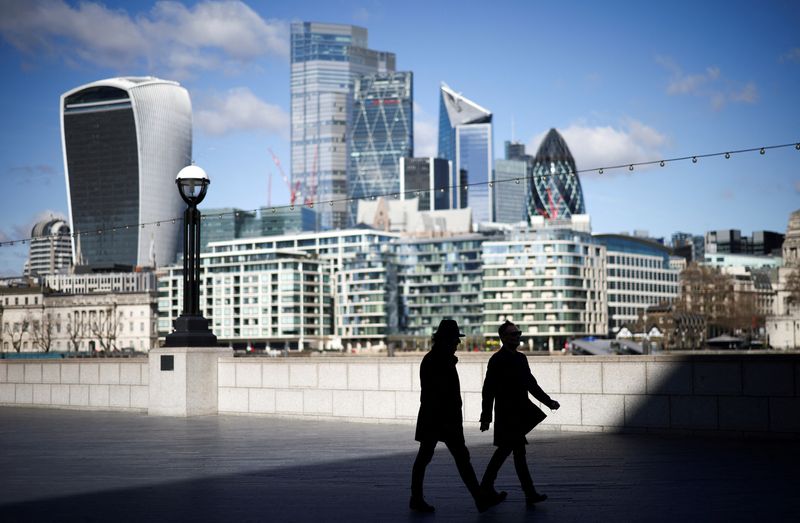By Andy Bruce
LONDON (Reuters) - British business activity cooled unexpectedly this month to an 11-month low but cost pressures stayed high, according to a survey that leaves the Bank of England on track to raise interest rates next week.
The IHS Markit/CIPS Composite Purchasing Managers Index (PMI) slipped in January to 53.4 from 53.6. While remaining above the 50 dividing line between growth and contraction, a Reuters poll of economists had pointed to a reading of 55.0.
The spread of the Omicron variant of coronavirus again hit consumer-facing companies and manufacturers said orders grew at the weakest pace for a year - although business and financial services companies saw a quicker rate of expansion.
The flash PMIs suggested a similar level of economic performance for Britain, Germany and France, the three largest European economies.
"All told, this PMI survey suggests that the (UK) economy is suffering a hangover from the surge in Omicron cases. Even so, we still think GDP will recover fairly swiftly over the rest of Q1," said Adam Hoyes, economist from consultancy Capital Economics.
Sterling and British government bond prices showed no reaction to the data.
Gauges of costs paid and prices charged by services companies - watched closely by the BoE - increased in January, after easing back in December from recent all-time highs.
"With inflationary pressures remaining elevated at near-record levels, this all adds to the likelihood of the Bank of England hiking interest rates again at its upcoming meeting," Chris Williamson, chief business economist at IHS Markit, said.
Twenty-nine of 45 economists in a Reuters poll published on Friday said the BoE would raise rates to 0.5% from 0.25% on Feb. 3 after its next scheduled meeting. [ECILT/GB]
British consumer price inflation hit a nearly 30-year high of 5.4% in the 12 months to December and many economists think it will go higher than the BoE's most recent estimate of a peak of around 6% in April.
The PMI for the services sector fell in January to 53.3 from 53.6 in December - its lowest level since February last year.
While the manufacturing PMI slipped to 56.9 from 57.9 in December, the decline reflected the way the survey measures supply chain delays, which eased further last month.
"There have been signs that some stubborn supply chain pressures have started to ease," Rhys Herbert, senior economist at Lloyds (LON:LLOY) Bank, said.

"However, the energy crisis and reports of new checks causing delays at ports are challenging many firms in the sector," he said, referring to the latest customs rules introduced on trade between Britain and the European Union.
Unlike in the much larger services sector, price pressures in manufacturing cooled in January.